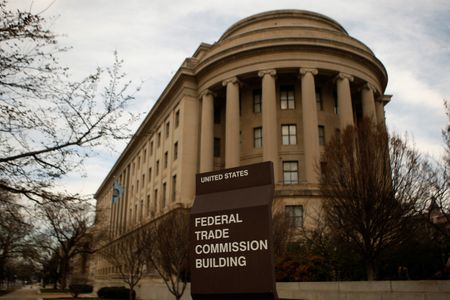By Moira Warburton and Jody Godoy
WASHINGTON (Reuters) -The U.S. Senate passed major online child safety reforms in a nearly unanimous vote on Tuesday, although the legislation, which has drawn mixed reactions from the tech industry, faces an uncertain fate in the House of Representatives.
Two bills – the Children and Teens’ Online Privacy Protection Act and the Kids Online Safety Act, nicknamed COPPA 2.0 and KOSA – would need to pass in the Republican-controlled House, currently on recess until September, to become law.
The Senate approved the bills in a rare bipartisan 91-3 vote.
COPPA 2.0 would ban targeted advertising to minors and data collection without their consent, and give parents and kids the option to delete their information from social media platforms.
“Kids are not your product, kids are not your profit source, and we are going to protect them in the virtual space,” Senator Marsha Blackburn, a Republican cosponsor of KOSA, said in a press conference after Tuesday’s vote.
Maurine Molak, cofounder of ParentsSOS, a group of parents who said their children’s deaths were linked to social media, called the vote a “historic and emotional milestone for myself and for all parents who have fought tirelessly to protect our children.”
Top U.S. social media platforms made an estimated $11 billion in advertising revenue from users younger than 18 in 2022, according to a Harvard study published last year.
KOSA would make explicit a “duty of care” that social media companies have when it comes to minors using their products, focusing on design of the platforms and regulation of the companies.
Executives at social media sites Snap and X said at a congressional hearing in January that they supported KOSA, while Facebook and Instagram owner Meta Platforms CEO Mark Zuckerberg and TikTok CEO Shou Zi Chew said they disagreed with parts of it.
CRITICS REMAIN
Tech industry groups and the American Civil Liberties Union have criticized the bill, saying that differing interpretations of harmful content could result in minors losing access to content related to vaccines, abortion or LGBTQ issues.
Senators amended the language of the bill in response to such concerns earlier this year, in part by limiting the enforcement responsibility of states’ attorneys general.
However even after the changes, critics remained.
“They made improvements, but not enough,” Senator Ron Wyden, a Democrat, told reporters on Monday night. “I still think it is going to harm a lot of LGBTQ kids because of the way it’s going to make it difficult for them to get information.”
He was one of the three votes against the bill on Tuesday.
Information Technology and Innovation Foundation, a think tank that receives funding from Meta, Google and other major technology companies, called the bills flawed. KOSA would open the door to censorship and COPPA 2.0 would cut off revenue for services aimed at teens, the group said.
“This country needs children’s online safety and privacy legislation that strikes the right balance between protecting consumers without infringing on their free speech rights or stifling innovation,” ITIF Senior Policy Manager Ash Johnson said.
(Reporting by Moira Warburton in Washington and Jody Godoy in New York; Editing by Scott Malone, Richard Chang and Marguerita Choy)












